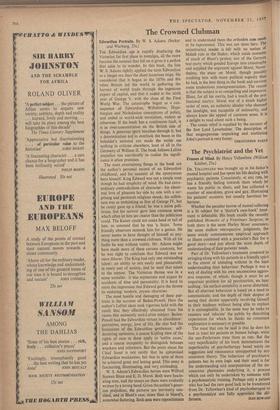The Crowned Clubman
THE Edwardian age is rapidly displacing the Victorian, for first place in nostalgia, all the more because the nemesis that fell on it gives it a pathos' that adds to its wonder. In this book, the late W. S. Adams rightly applied the term Edwardian to a longer era than the short luxurious reign. He considered that it began in the 1870s and 80s when Britain led the world in gathering the harvest of world trade through the ingenious export of capital, and that it ended in the ninth year of George V, with the close of the First World War. The catastrophe began as a con- sequence of Edwardian, Wilhelmine, Haps- burgian and Nicholasian conceptions of policy, and ended in world-wide revolution, violent or otherwise. If the book has a continuous fault, it is in over-concentration on the British side of things. A generous spirit breathes through it, but a determination not to overlook the beam in the beholder's national eye made the writer see nothing to criticise elsewhere, least of all in the Germany of William II. The book follows Leftist prejudice too uncritically to realise the signifi- cance it often promises.
The most entertaining things in the book are the author's personal record of an Edwardian childhood, and his account of the eponymous hero himself. King Edward was not a simple man though he had simplicity of mind. He had extra- ordinary contradictions of character: his abnor- mal love of pleasure lay side by side with a sur- prising and persistent religious streak; his selfish- ness was as unthinking as that of George IV, but he rarely gave up a friend; he was a naive poli- tician, but his naïveté gave him common sense which often let him see clearer than the politicians could. The Kaiser could not make head or tail of him, so assumed that he was `a Satan.' Some friendly observers mistook him for a genius. He never seems to have thought of himself as any- thing more than a crowned clubman. With all his faults he was without vanity. Mr. Adams might have made more of these curious contrasts, but he was right to conclude that Edward was no mere *Main The King had only one outstanding talent : an ability to mix easily and pleasurably in every sort of society, and he used that talent to the utmost. The Victorian throne was in a sense unstable : it was mysterious and august by accidents of time and personality. It is hard to resist the impression that Edward gave the throne its enduring, modern, joyous character.
The most hostile and damaging of these por- traits is the account of Baden-Powell. Here the author's Leftist ideas took vigorous hold with the result that they effectively obscured from his vision this eminently non-Leftist subject. Baden- Powell had the Edwardian virtues in abundance: patriotism, energy, love of life. He also had the limitations of the Edwardian gentleman : self- deceiving optimism, a coarse Kipling view of the rights of man as these apply to `native races,' and a coarse incapacity to distinguish between wreckers and reformers. But the point about the Chief Scout is not surely that he epitomised Edwardian weaknesses, but that in spite of them he achieved great and lasting good. This essay is fascinating, illuminating, and very misleading.
W. S. Adams's Edwardian heroes were Wilfred Scawen Blunt and E. D. Morel. Both were fascin- ating men, and the essays on them were evidently written by a loving hand. Given the author's gener- ous prejudices, the pictures are inevitably one- sided, and in Blunt's case, more than in Morel's, somewhat flattering. Both men were oppositionists and to understand them the orthodox case needs to be represented. This was not done here. The uninstructed reader is left with no notion of Mandi rule in the Sudan, which made nonsense of much of Blunt's protest, nor of the German war-party which goaded Europe into catastrophe and supplied the argument against Morel. Never- theless, the essay on Morel, though possibly crediting him with more political sagacity than he had, is the best thing in the book and survives some tendentious misrepresentation. The reason is that the subject is so compelling and impressive. Blunt, for all his merits, had a touch of the pro- fessional martyr. Morel was of a much higher order of man, an authentic idealist who shunned the limelight, was incapable of insincerity, and always knew the appeal of common sense. It is a delight to read about such a being.
The comic relief is supplied by the account of the first Lord Leverhulme. The description of that magnoperator unpacking and mutilating John's portrait is very funny.
CHRISTOPHER SYKES










































































 Previous page
Previous page